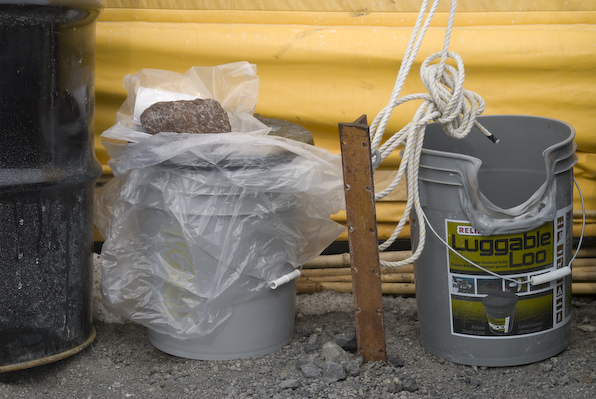Mail archives:
Polar Mail
December 3, 2007
Question:
Guten Tag, Hugh!
Here is my Very In-depth Scientific Question: how do you do poop there?
Since you touched on the subject of keeping camp sites pristine, and the fact that any 'deposited' human waste will remain there for millenia, what do you do? Are there Antarctic rated Port-a-johns? And if so, is there Chuck Norris related graffiti in them? Do you (God forbid) have to haul out EVERYTHING you leave behind? Or do you burn it (like we did at the Combat Outpost in Baghdad) in half-cut oil barrels with diesel fuel? And what to do have to do to be saddled with the unenviable job of stirring the burning poop?
Inquiring minds want to know. I think there is a thesis topic in here somewhere :) Keep up the great work, and keep the awesome posts and pictures coming. I am very very proud of you, and completely jealous to boot!
Love,
Owen Powell
U.S. Army
Germany
Answer:
Hey Owen!
Great to hear from you (Owen's my older brother, everyone), and thanks for broaching this delicate but fascinating topic. It's one that inevitably crops up in any conversation I've had about life here. The short answer is yes, we do haul out EVERYTHING - you need to think ahead before leaving camp to go look at penguins for the day. We aren't equipped with insulated portajohns. Instead, we perch on a 5-gallon bucket equipped with a removable toilet seat (some projects get comfy insulated seats, but ours is cold black plastic). The seating is open-air, which means you get to contemplate a wonderful view but there's no place to write Chuck Norris graffiti. Though I suppose in this case it might be Shackleton graffiti or perhaps artistic renderings of the malicious penguin from Wallace & Gromit.
Back at McMurdo there's a wastewater treatment plant, but the buckets we bring back from the field get packed onto a ship and sent back to California. It's hazardous cargo, so there's a lot of paperwork involved, one of the guys in the shipping department told me.
Thanks again for your question, Owen, and take care in Germany. See you when I get back.

Here's a picture of the 'facilities' outside the tent... #1 on the right, #2 on the left.
Question:
Hi,
If i may inquire what the weather is like to-day with you, what is the temperatures like, and what are you already discovering in your penguin research, and about climate change in Antarctica?.
Best wishes
Bill Reddin
Republic of Ireland
Answer:
Hi Bill, and thanks for your reading! I'll turn this question over to
the lead researcher, Dr. David Ainley, who has been camping here at
Cape Royds for the past 12 summers. You can read plenty more about his
research at www.penguinscience.com.
Today is snowy and a bit windy, though nothing heroic. The temperature right now is -5.6C (~20F). It's been on the coldish side so far this season, here on the shores of Ross Island (warmed a bit by proximity to the sea). We've had no days when the T has been above freezing.
This season we've learned that recovering from five years of producing no chicks here at Cape Royds is going to take at least several seasons. During 2001-2005 the penguin colonies in this part of the Ross Sea were challenged by unusually extensive sea ice owing to the grounding of huge ice bergs. The ice built up and was not wafted away by the winds, the icebergs acting like a dam. So, it's too far to walk from colony to the open sea and as a consequence the penguins gave up their breeding efforts. It was like a Rapid Climate Change Event that in just a few years duplicated what likely were conditions during the last Ice Age. Well, so now the icebergs are gone, the sea is open, but as penguins mature slowly it will be several years before young recruits begin to show up.
Otherwise, we're finding, at some other locations, that receding snow and ice is providing room for penguin colony expansion. Thanks for your question,


